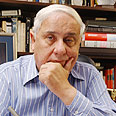
Eitan Haber
צילום: שלום בר טל
Our troops come first
Truth must be told: IDF soldiers do not act like indiscriminate killers
In the days before the Six-Day War, the Syrians would fire at IDF patrol vehicles on a daily basis. As a bold military correspondent, I sought to describe such patrols to my readers, with the knowledge that the moment our daily patrol will arrive at a certain spot it will face heavy fire.
The patrol’s commander was Colonel Haim Sela, may he rest in peace. We drove close to the Syrian positions, but nothing happened. I wrote about it in the paper that day, and silently thanked my good fortune and the Lord for not encountering the Syrian fire.
The next day we repeated the same journey. As we approached the Syrian position, we held our breath. We were tense. There is no way to measure this tension, when a person knows his life is hanging in the balance. Any soldier who ever took part in an operation against enemy forces would be able to describe those anxious minutes and seconds better than me.
And then, close to the Syrian position, a keychain fell out of the pocket of one of the soldiers. It sounded like a bullet hit. A second later, the ground shook. Everyone was firing at everyone. The artillery forces joined in, and so did the tank corps. All hell broke loose. We, the journalists, were down on our knees in our military vehicle, praying to God, to mom, and to dad to save us from this inferno.
What I’m about to write is not directly aimed at members of Breaking the Silence. They are acting in line with their conscience, and at times we say to ourselves: It’s a good thing we have such people. We also have no doubt that they experienced difficult moments at war and during routine security operations. Our problem is that they are unwilling to take into consideration, or so it seems at least, the real problem: During war, a split second can often make the difference between one’s sigh of relief and the sigh of pain of one’s parents several hours later, when IDF officers knock on their door.
Us or them
On many occasions during battle, it’s either us or them, and at times “them” happens to be a woman who walked in the shades, an old man who peeked at the wrong moment, or a curious child.
I’ve seen a lot in my life, and regrettably I also saw the dismembered bodies of children, women, and the elderly who paid the price of war with their lives. There is no such thing as sterile wars. The question is whether Breaking the Silence realizes that soldiers fear for their lives – and fire.
This does not mean, heaven forbid, that IDF soldiers do not have the duty to be doubly careful, or that our troops our trigger-happy, but we need to say the following clearly, as cruel as it may seem: Many innocent civilians die in wars - Also, but not only, because IDF soldiers seek to safeguard their own lives, and their own lives are more important to them than the lives of others. War is not a game.
All those honorable members of Breaking the Silence should have made a distinction between an indiscriminate killing spree, bordering on glee, and the adoption of cautious steps, even exaggerated ones, in order to avoid harm to oneself. This is the way it works: Our troops come first.
The IDF, and that’s the truth, examines each and every such case, draws conclusions, and at times punishes more severely than other armies in the world. When one of these days we’ll gain access, for example, to the tales of the US Army in Iraq, it will turn out that compared to it the IDF was like a monastery inhabited by saints.
It’s a good thing that we are talking, that we are drawing conclusions and learning lessons, and that we are investigating and indicting, and punishing. However, we need to say this to ourselves: The life of an IDF soldier is immeasurably worthier than the life of an innocent victim, whose death we should genuinely regret.










